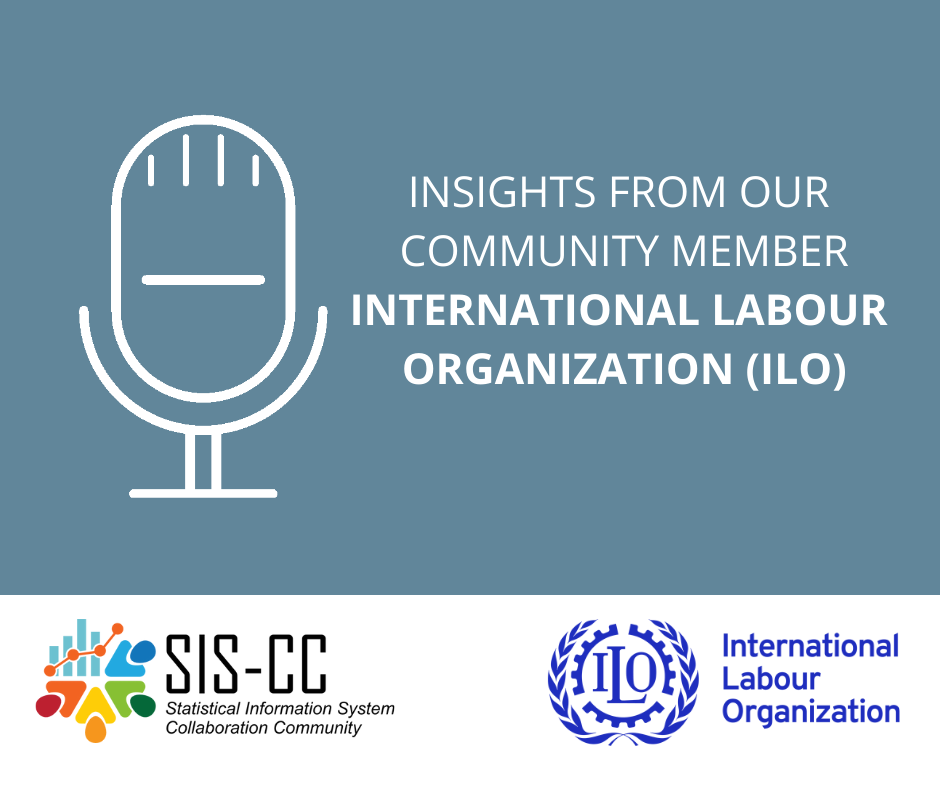
During our community workshop in February 2023, we sat down with Edgardo Greising, Head of the Knowledge Management Solutions Unit at the International Labour Organisation (ILO) and Chair of the SDMX Technical Working Group (TWG). We spoke about ILO’s experience with the .Stat Suite, what challenges ILO encountered, and what future he sees for the Statistical Information System Collaboration Community (SIS-CC).
ILO is using the .Stat Suite Data Explorer for their own data dissemination and .Stat Core for data storage. Overall, ILO is pleased with the experience; in particular connecting the Data Explorer as a visualisation tool to their existing SDMX web service. In ILO’s words the .Stat Suite has proven to be a very solid solution for the storage and dissemination of Labour Market Indicators, and ILO is pleased to report that the process has been smooth.
The challenges ILO is facing today is the complete implementation of Labour Market Information System (LMIS) in their constituents countries; a project that has been ongoing for the past 5 years spanning over 25 projects worldwide with some of them very successful like EL Salvador, which is already in production, and others, like Chile are preparing to implement .Stat Suite migrating from the previous .Stat version.
The main challenge for the LMIS project lies in the harmonisation of concepts; since the data is coming from multiple databases. Moreover, a proper network of institutions needs to be established and a smooth exchange of information ensured. ILO helps the participating countries to establish governance and capacity building in aspects related to data harmonisation, the use of SDMX and data modelling.
The ILO has been participating in activities of the SIS-CC since 2013 and they are very happy to be an active member of the community, since the community approach is an excellent way to develop software products like .Stat Suite, but also to create synergies among the different institutions in terms of data sharing, data modelling and improving the data collection.
“I think there is a very interesting future around the SIS-CC. I see a community stronger with new members, new players in the field each day. The incorporation of StatCan and FAO, the last members to join, tells us that we are going in the right direction.” Edgardo Greising, Head of the Knowledge Management Solutions Unit at the International Labour Organisation (ILO) and Chair of the SDMX Technical Working Group (TWG), International Labour Organization
ILO is namely developing the Labour Market Information System (LMIS). Under the umbrella of its SIS-CC membership, ILO provides .Stat Suite, including technical assistance and upgrades, free of charge to all countries implementing a LMIS following ILO’s recommendations. In the scope of the LMIS program, ILO has successfully supported the installation of INE.Stat, the .Stat Suite interactive and free to use repository of statistical data, managed by the National Institute of Statistics of Chile. More projects are ongoing worldwide with more than 25 countries, including Guyana, Namibia, Jordan, South Africa, and Peru.
Another successful project is with the Ministry of Labour and Social Security of El Salvador who launched SIMEL, the first Labour Market Information System in the Central American region and second of its kind in the Latin American region. SIMEL, with .Stat Suite at its core, responds to the need to overcome the statistical gap in labour matters and to provide timely and internationally comparable statistics to better diagnose the labour situation in the country. Read more about how El Salvador implemented LMIS on our blog.
LMIS is a network of institutions, persons and information that have mutually recognised roles, agreements and functions with respect to the production, storage, dissemination and use of labour market related information and results in order to maximise the potential for relevant and applicable policy and programme formulation and implementation.
More information on LMIS can be found on the ILO website.


